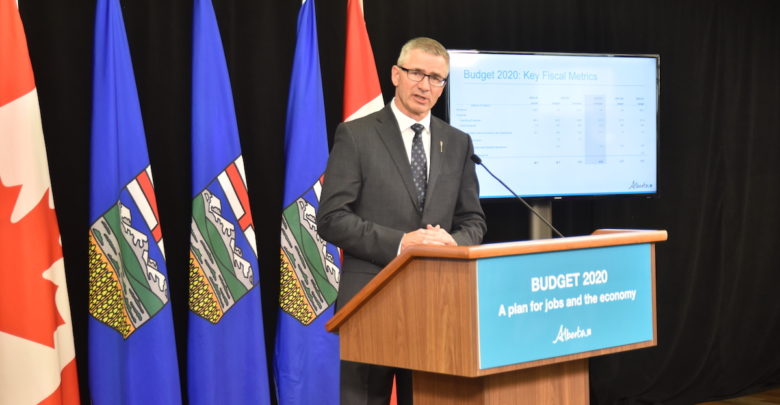BREAKING: Budget 2020’s impact on post-secondary
Budget 2020 outlined several new announcements while re-announcing several programs and plans
 Tina Tai
Tina TaiAlberta’s new provincial budget allocates no new funding to student aid and infrastructure projects while decreasing overall funding to the Ministry of Advanced Education.
Budget 2020 was unveiled at the Alberta legislature by finance minister Travis Toews on February 27. Within it several measures were announced, including a curtailment of funding for the ministry of advanced education, new international student post-graduation path to permanent residency in the province, and the formal adoption of performance-based funding.
Province-wide, tuition fees are projected by the government to increase by $290 million between 2019 to 2023 — an average of 6.9 per cent; 0.1 per cent lower than the allowed limit set by the province of 7 per cent.
Both student aid grants and scholarships are frozen at current levels, at over $47 million and $54 million, respectively.
Campus Mental Health Fund maintained for one year
Budget 2020 committed to maintain the $8.8 million in funding for the Alberta Campus Mental Health Fund. Ministry officials were unable to confirm if this funding would go beyond 2020-21.
“Fast track” immigration for some international students
A new foreign graduate entrepreneur program will offer “fast track immigration opportunities” for international students who graduate from Alberta post-secondary institutions. This will help attract “highly qualified foreign students” to the province and employ them here post-graduation.
No new funding for infrastructure projects
Budget 2020 said $288 million over the next three years will be spent on infrastructure renewal projects across the province. This is not new funding; it was previously announced and includes projects like the Dentistry-Pharmacy Building renewal at the U of A.
Infrastructure maintenance program funding is restored by the budget. In 2019, the funding was brought to zero for the entire province. The new budget will restore $119 million in funding for 2020-21.
Ministry funding decreasing alongside post-secondary budgets
The Campus Alberta Grant, which helps cover the cost of instruction at post-secondary institutions, will decrease by over $100 million in 2020-21.
Since 2018, the Ministry of Advanced Education budget has decreased by 11 per cent.
Expenses from the ministry were budgeted in 2019 as $5.1 billion — down five per cent from 2018. In Budget 2020, expenses are budgeted a further six per cent lower than their forecast.
According to Budget 2020 documents, the savings have come from:
- Enhanced controls over hiring and procurement;
- Travel restrictions;
- Closing under-subscribed programs;
- Relocating from leased space to on-campus facilities;
- Long-term multi-year fiscal planning;
- Staffing reductions, which “have begun” and “will continue.”
Additionally, compensation for academic and non-academic staff within the post-secondary sector is decreasing approximately $118 — by $57 million in 2022 and $61 million in 2023 —by 2023. This is being attributed to job reductions and attrition.
Performance-based funding part of unknown three-phase plan
According to the government’s fiscal plan, the MacKinnon Report recommendations for post-secondary will be addressed in three phases. The first phase will be implemented through Budget 2020. The budget formally introduces performance-based funding for institutions.
In 2018-19, post-secondary institutions funded 43 per cent of their operating expenses and government provided the remaining 57 per cent. Under Budget 2020, institutions will be “expected” by 2022-23 to fund 48 per cent. This translates to an approximate $100 million loss a year for government support to post-secondary education.
Established under Budget 2019, the $1 million Skills For Jobs Task Force is “ensuring Albertans have the skills demanded by Alberta’s labour market.” Budget 2020 says labour in Alberta is being “reskilled” to meet market demands.
“Existing resources will be analyzed and re-profiled as necessary to address private sector labour needs,” the budget documents outline.
According to Budget 2020, performance-based funding will assist in the implementation of positive outcomes for Alberta’s labour market.
The documents say introducing performance-based funding will “shift away from applying funding increases to all post-secondary institutions equally, regardless of performance.”
During the introduction of the budget to the legislature, Minister Travis Toews said performance-based funding will result in Albertans having “good tangible careers.”
“[The] new outcomes-focused funding model for post-secondary education will provide base support to institutions, and then top that up with performance-based incentives,” Toews said.
Budget 2020 documents say this move reduces red tape and encourages “better outcomes” from post-secondaries. Additionally, documents say this will afford institutions more “self-generated revenue” and give them more autonomy over activities such as “borrowing” and “disposing of assets.”
The remaining two phases, not outlined in Budget 2020, will be released in “future years” and will address other MacKinnon Report recommendations pending stakeholder consultation.




